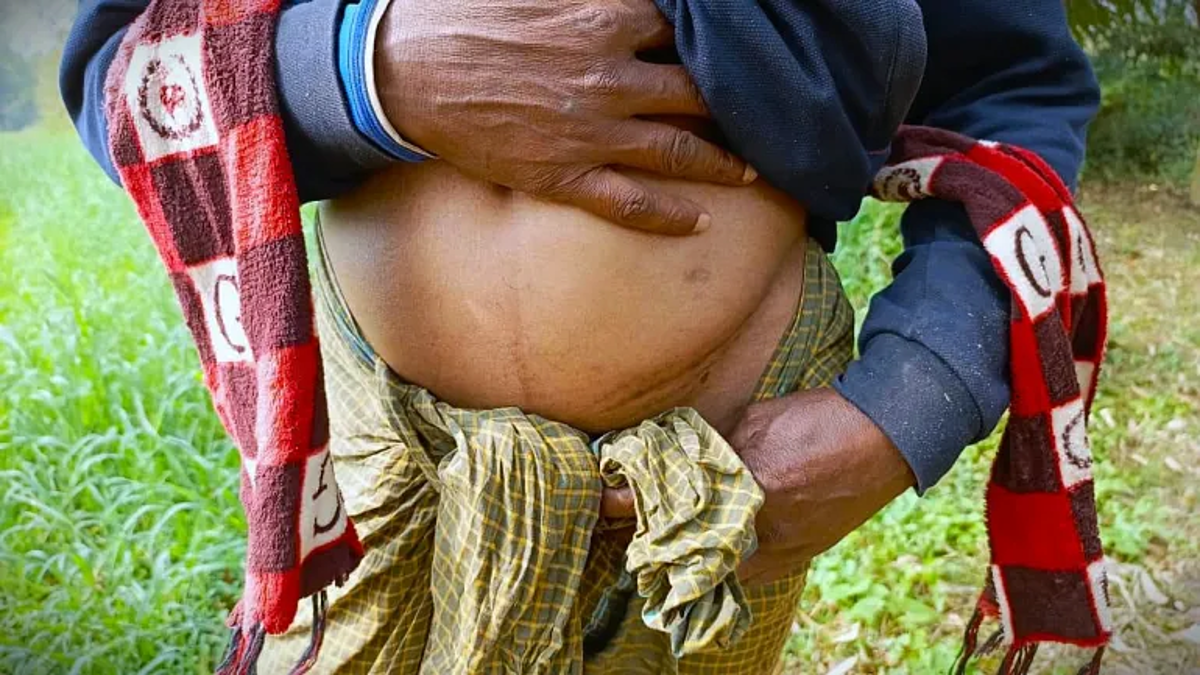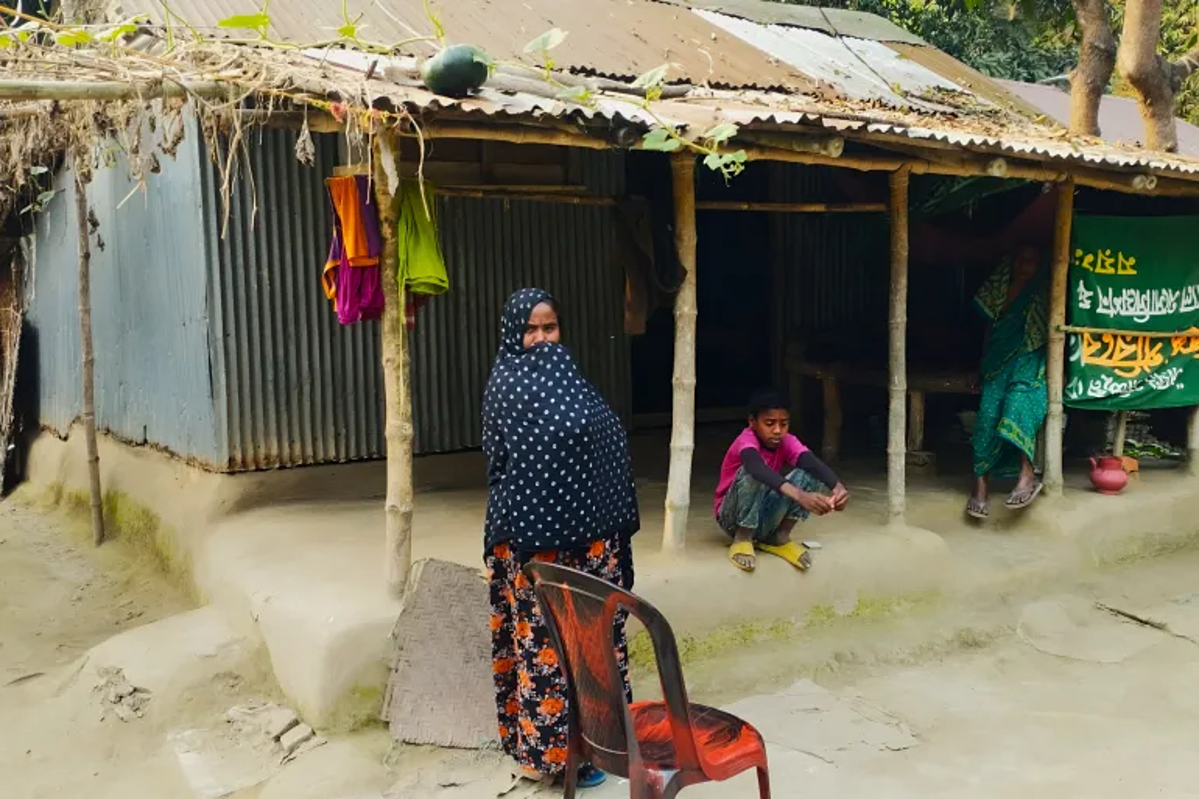In the summer of 2024, Safiruddin, from Baiguni village in Kalai Upazila, sold his kidney in India for 350,000 taka (approximately 2,850 USD). He hoped the money would lift his family out of poverty and allow him to build a house for his three children (two daughters, 5 and 7, and a 10-year-old son). But the money quickly dwindled, the house remains unfinished, and his body now carries persistent pain.
His declining health forces him to do manual labor at a cold storage facility. The constant pain and fatigue make even simple daily tasks difficult.
"I donated my kidney only because I wanted a better life for my family. I did it all for my wife and children," he shared.
At the time, Safiruddin didn't realize the potential danger. Brokers approached him with smooth talk, painting a simple picture, as if it were a life-changing opportunity, not a gamble with his health. Though initially hesitant, desperation drove him to this drastic measure.
They took Safiruddin to India on a medical visa, arranging everything from plane tickets and paperwork to hospital procedures. Everything seemed smooth and legitimate. In India, despite still holding his real Bangladeshi passport, he was given false documents, including a certificate of kinship with the recipient to legalize the transplant. His identity was changed, and his kidney went to a stranger he never met.
"I had no idea who received my kidney. They, the brokers, didn't tell me a thing," Safiruddin recounted slowly.
Organ donation in India is legally permitted only between blood relatives or with special government approval. However, organ traffickers have found ways to circumvent the law: forging family relationships, altering hospital records, and manipulating DNA test results to smoothly overcome legal barriers.
 |
Safiruddin's scar after the kidney transplant. Photo: *Al Jazeera* |
Monir Moniruzzaman, a professor at Michigan State University and a member of the World Health Organization's Task Force on Organ Transplantation, explained that typically, the seller's identity is changed, accompanied by a notarized lawyer's certificate, to establish a false family relationship with the recipient.
"Fake identity cards make the story even more convincing, turning the donor into a sister, daughter, or another family member, as if the donation was out of compassion, not for money," Monir added.
Safiruddin's story is not unique. Kidney donation is so common in Baiguni village that this community of fewer than 6,000 people is known as the "one-kidney village." The Kalai Upazila region, where Baiguni is located, is a hotspot for kidney trafficking. A 2023 study in the *British Medical Journal Global Health* estimated that one in every 35 adults in the area has sold a kidney.
Kalai Upazila is one of the poorest regions in Bangladesh. Most kidney donors are men over 30, lured by the promise of quick money. According to the study, 83% of those surveyed said poverty was the main reason they sold a kidney, while others cited debt repayment, drug addiction, or gambling.
Safiruddin said the brokers kept his passport and never returned it. He didn't even receive a post-surgery prescription. "They took everything and disappeared, leaving me with nothing," he said, his voice dropping.
Josna Begum, a 45-year-old widow in Kalai Upazila, thought selling her kidney would change her life. In 2019, she and her new husband, Belal, went to India with the promise of 700,000 taka. But after the surgery, she received only 300,000. Before she could stabilize her life, Belal abandoned her to marry someone else. Josna now lives in pain, without enough medicine, and with nowhere to turn. "My life is over," she sobbed.
Mohammad Sajal, a former businessman in Dhaka, lost everything after an e-commerce platform collapsed. Desperate, in 2022, he agreed to sell his kidney hoping for 1 million taka but received only 350,000. Feeling cheated, Sajal started working with the same brokers who had deceived him, becoming a link in the kidney trafficking chain. However, when financial conflicts arose, he fled, fearing retaliation. "No one volunteers to donate a kidney for fun. It's the choice of those with no other way out," he said.
Bangladeshi authorities said they have deployed undercover investigators to monitor organ trafficking. Indian authorities have also arrested several doctors, including Vijaya Rajakumari, who is accused of performing dozens of kidney transplants for Bangladeshi patients. However, experts say these scattered arrests are not enough to dismantle the network.
In India, the Transplantation of Human Organs Act (THOA) stipulates that kidneys can only be donated to blood relatives or with the approval of a licensing committee. However, this system is easily manipulated. False documents are created, family relationships fabricated, and licensing committees sometimes approve applications without proper verification.
Hospitals are also accused of turning a blind eye for financial gain. "The more transplants, the more revenue. Even if fraud is detected, hospitals claim the documents are valid to avoid responsibility," Moniruzzaman said.
Many doctors and hospital board members are even accused of accepting bribes from brokers. Meanwhile, the kidney trafficking ring constantly changes locations to avoid detection. Wealthy recipients typically pay 22,000-26,000 USD, but donors receive only 2,500-4,000 USD. Most of the profit goes to brokers, doctors, and document forgers.
Many victims do not actively sell their kidneys but are tricked with promises of jobs in India. They are taken to hospitals under false pretenses and undergo surgery without fully understanding what they are facing.
Last September, authorities uncovered a human trafficking network in India that held Bangladeshi workers under the guise of recruitment, then forced them to donate kidneys for minimal compensation. That same year, Bangladeshi police arrested three individuals in Dhaka. These individuals had taken at least 10 people to New Delhi under the pretense of job placement. But instead of stable employment, the victims were forced to undergo kidney removal surgery without a clear explanation of the consequences and received almost no proper compensation.
"Some people deliberately sell their kidneys out of extreme poverty, but a significant number are deceived. A wealthy patient in India needs a kidney, and a broker finds a donor in Bangladesh. This could be someone in dire straits or lured by the promise of a job, and the vicious cycle continues," said Shariful Hasan, deputy director of the Migration Program at BRAC, one of the world's largest non-governmental organizations.
 |
Baiguni village, in Bangladesh's Kalai Upazila, is known as the 'one-kidney village'. Photo: *Al Jazeera* |
Vasundhara Raghavan, chief executive of the Kidney Warriors Foundation, a support group for kidney patients in India, said: "The lack of legal donors is one of the core reasons driving organ trafficking. Desperate patients turn to illegal avenues, fueling a system that profits from the poor." She acknowledged that current laws are designed to prevent the commercialization of organs, but in reality, they push this market deeper into the shadows.
Experts are calling for a more transparent and humane legal framework, including mandatory health checks, post-transplant support, and financial security for donors. But for now, people like Safiruddin are left with only pain and regret.
"I can't work normally anymore. They took my kidney and vanished," he said.
Thuc Linh (*Al Jazeera*)












